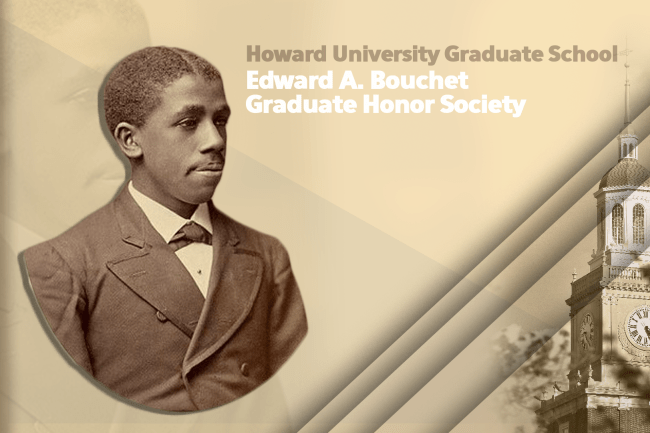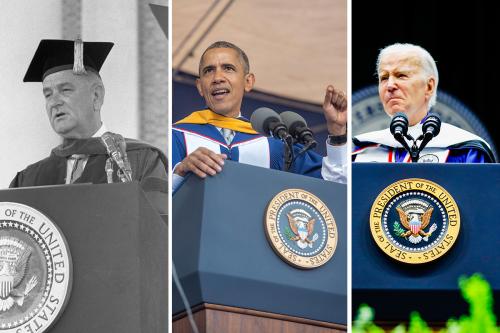
WASHINGTON – Five Howard University Graduate School Ph.D. candidates have joined a network of preeminent scholars across the country as inductees into the Howard chapter of the Edward Alexander Bouchet Graduate Honor Society. The doctoral scholars, Collis A. Brown, Tanya E. Gardner, Majella Chube Hamilton, Bryan M. Jenkins and Raina Rhoades, were inducted at the Annual Yale Bouchet Conference this April and are honored for exemplary leadership in their respective fields. They have demonstrated commitment to scholarship in service of others and advocacy of students who have been traditionally underrepresented in the academy.
The Bouchet Graduate Honor Society recognizes diversity and excellence in doctoral education. “We are proud of the five Ph.D. candidates and their service, scholarship and advocacy for issues that matter to the communities they serve. We have high expectations of all our students; these scholars affirm their ability to meet them at every turn. The faculty who has taught and mentored them are also to be lauded for nurturing our scholars’ intellectual curiosity and positioning them as the change-making agents for a better world,” said Dana Williams, Ph.D., dean of The Howard University Graduate School.
“Each of our nominees embodies the legacy of Dr. Bouchet through the depth and impact of their scholarship, their mentorship of underrepresented students, and their leadership in service of others,” said Miriam Okine Davies, assistant dean of the Graduate Office of Student Affairs at the Graduate School. The 2022 inductees join a national network of peers committed to cultivating an inclusive, diverse and equitable graduate education landscape for all.
Meet the Inductees
Collis A. Brown, Pharmacology
Collis A. Brown is a Ph.D. candidate in pharmacology. Her research focuses on the neurodegenerative pathogenesis of fragile X tremor/ataxia syndrome (FXTAS) and the discovery of potential pharmacotherapy. FXTAS is a late-onset disorder, usually occurring after age 50, for which there are currently no effective treatment options. Brown has been recognized as TL1 Scholar in the Translation Biomedical Science (TBS)/Georgetown-Howard Universities Center for Clinical and Translational Science (GHUCCTS) program, which seeks to prepare the next generation of leaders in the translation of basic science into improved outcomes for health, aging and disease.
“Dr. Bouchet’s impact has translated to generations of young innovative African American graduate students ready to address our society’s issues and concerns. Being part of this honor society only furthers my mission to [continue] Dr. Bouchet’s legacy of impacting future generations with my commitment to advocacy in science,” shares Brown.
Tanya E. Gardner, Communication, Culture and Media Studies
Tanya E. Gardner was a Ph.D. candidate in communication, culture and media studies, with a focus on health communication. Her research addresses health disparities that impact historically underserved communities. Gardner has co-authored publications on COVID-19, student stress experiences, and public perceptions of the Black Lives Matter movement on Twitter. Tanya earned her Bachelor of Arts in communication studies from Temple University and her Master of Arts in human communication studies from Howard University. She aspires to work in public policy and focus on research that addresses issues impacting communities of color.
“The road to my doctorate program has been paved by the journeys of others before me, including Dr. Bouchet,” says Gardner. “As a service-driven scholar, I aim to use my lived experiences and research to influence public health policies that impact the lives of historically marginalized communities.”
Majella Chube Hamilton, United States History
Majella Chube Hamilton is a Ph.D. candidate in history focused on U.S. and public history. Her research focuses on the cultural identity and collective agency of the African American residents of Alabama following the Civil War, from Reconstruction through the early 20th century, when organized and institutional community networks laid the fertile groundwork for the Birmingham civil rights movement. Hamilton serves as executive director of the Ballard House Project in Birmingham, Alabama. For her professional and community contributions, Hamilton was elected by the Alabama legislature to the Board of Trustees of the Alabama Department of Archives and History.
“I was raised by two educators and civil rights activists who ingrained in me the importance of respecting the dignity of all humanity, expressed through their unique cultures and experiences. The ties that bind us through our communities are much more powerful than what separates us,” shares Hamilton. “I am grateful for this honor and opportunity to engage and collaborate with other scholars of color to seek solutions that will advance our communities actively.”
Bryan M. Jenkins, Communication, Culture and Media Studies
Bryan M. Jenkins is a Ph.D. candidate in communication, culture and media studies. His research explores how marginalized groups utilize digital space as a tool to educate and empower one another. His dissertation investigates Black podcasts as a critical educational tool for Black communities that continues the traditions of Black orality. Jenkins has been recognized as an Ernest E. Just and Percy L. Julian Research Fellow. His research has been published in the Popular Culture Studies Journal and the Howard Journal of Communications. This research will also be featured in an upcoming Digital Humanities Quarterly special issue.
“I am excited to work on projects that use digital technology to highlight the culture and history of Black, Indigenous and other people of color,” says Jenkins. Through this work, Jenkins states, “I [aim] to contribute more stories to the archives that will serve as a starting point for future scholars.”
Raina Rhoades, Biology
Raina Rhoades was a Ph.D. candidate in biology, specializing in bioinformatics. Her research focuses on the effect of missense mutations on the MERS-CoV spike glycoprotein and the development of long-term psychological symptoms associated with “long-COVID.” Rhoades has also co-authored publications investigating the role of missense mutation in SARS-CoV-1 and SARS-CoV-2 glycoproteins. Her research activities have helped hone her bioprogramming skills, statistical analysis and protein structure modeling skills. Rhoades received her Bachelor of Science in psychology from Morgan State University and her Master of Science in neuroscience from Vanderbilt University. As Rhoades moves forward in her career, she hopes to promote science literacy and continue mentoring and inspiring underrepresented students to pursue careers in science.
“I believe in facilitating a learning environment where students can reach their full potential [and] develop confidence in themselves to find answers, resources and methodologies that can help them solve problems, communicate their ideas and collaborate with others. I believe this is crucial for marginalized students who may not have received adequate support in their primary or secondary education,” shares Rhoades. “I advocate for scientific literacy by helping students see how even the most elementary experiments, [conducted] in our Biology 101 Lab, relate to real-world issues.”
###
About the Edward A. Bouchet Graduate Honor Society
The Bouchet Graduate Honor Society, established by Yale and Howard universities in 2005, honors the life and legacy of Edward Alexander Bouchet, who made history in 1876 as the first African American to earn a Ph.D. in the United States. The Bouchet Honor Society represents a network of preeminent scholars who exemplify academic and personal excellence, foster environments of support, and serve as examples of scholarship, leadership, character, service and advocacy for students who have been traditionally underrepresented in the academy.
About Howard University
Founded in 1867, Howard University is a private, research university that is comprised of 14 schools and colleges. Students pursue more than 140 programs of study leading to undergraduate, graduate and professional degrees. The University operates with a commitment to Excellence in Truth and Service and has produced one Schwarzman Scholar, three Marshall Scholars, four Rhodes Scholars, 12 Truman Scholars, 25 Pickering Fellows and more than 165 Fulbright recipients. Howard also produces more on-campus African American Ph.D. recipients than any other university in the United States. For more information on Howard University, visit www.howard.edu.
Media Contact: Aaliyah Butler; aaliyah.butler@howard.edu





